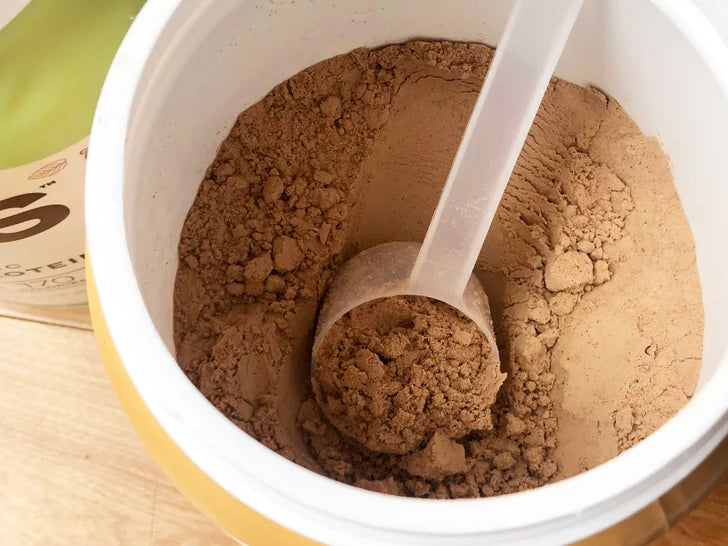Sustainable Dieting: Plant-Based Protein Powders

From a young age, we are taught to eat a balanced diet that includes vitamins, fats, proteins and carbohydrates. Modern society has developed hundreds if not thousands of sources of these nutrients.
However, none of these essential nutrients has tongues wagging as much as protein. Workout enthusiasts are constantly on the lookout for the ultimate source of protein to build muscles, and they found one: protein powder.
Protein powders are easy to use, making them the go-to product for the ever-busy professional looking for a protein boost on the go. Add a few scoops of the powder into your smoothie, and you're all set.
As the protein powder market grows, there are countless varieties to choose from. Some offer quality nutrition, while others have hidden ingredients that directly contradict the end consumer's goal of staying healthy. This leads to a polarizing argument in the protein powder industry: plant-based or whey protein powder — which is better?
The Difference between Plant-Based and Whey Protein Powder
Whey is a byproduct of cheese production. A whey protein powder is manufactured by adding proteins to a whey base to make a final product that is usually flavored. Whey protein powders are a great way to add those proteins to your diet, but people with lactose intolerance may be allergic to them. Some manufacturers produce whey protein concentrate, which contains even more lactose than typical whey powder.
On the other hand, plant-based protein powders are manufactured from various plants, including soy, brown rice and hemp. Some manufacturers also choose to incorporate different vegetable and fruit extracts as well as vitamins for added nutritional value.
The Perks Of Using Whey Protein Powder
-
Contains complete proteins
One of the top reasons consumers prefer whey protein powder is its high complete protein content. Only soy and a few other plant sources contain complete protein. A complete protein contains leucine, methionine, threonine, valine, lysine, histidine, isoleucine, phenylalanine and tryptophan. These are the nine amino acids your body needs but cannot produce on its own.
-
More protein in one scoop
With many whey protein powders, you can get all the protein you need for a day in just one 30-gram scoop. On the other hand, you may need to take more plant-based protein powder to meet your daily requirements. Because of this, a container of whey protein powder offers more servings and can be more economical than a plant-based product of the same size.
-
Builds more muscle
Some studies suggest that fitness enthusiasts who use whey powder increase muscle faster and more efficiently than those who prefer plant-based alternatives. Scientists believe the secret is the complete proteins contained in the whey-based product.
Advantages Of Plant-Based Protein Powder
-
Safe for lactose-intolerant people
About 30 million people in America today have been diagnosed with some degree of lactose intolerance. The actual number is expected to be higher because most don't seek medical help for this issue. For many, consuming lactose-containing products can be risky, so plant-based products without dairy are a lifesaver.
-
Safe for vegans
Vegans may not be medically affected by animal products, but they avoid all animal products as part of their diet and lifestyle. For them, plant-based protein powder is a convenient alternative to whey products. However, anyone who avoids consuming animal products will want to read ingredient lists to confirm that their plant-based protein powder is 100% vegan-friendly.
Choosing the Right Protein Powder
Now that you know the benefits of plant-based and whey protein powders, how can you choose one from the numerous options at the store? Here are a few things you should always do.
-
Read the ingredients
Many additives and chemicals can make some plant-based protein powders unhealthy for consumers. Some ingredients to look out for inclue xylitol, erythritol and casein. If you have celiac disease, you should also watch out for powders that contain gluten or gluten-containing ingredients.
-
Look for quality marks
Always check protein powder for the necessary regulatory tests and approvals to ensure they are certified and healthy for consumption. Protein powders without these marks may contain contaminants like mercury and arsenic or banned substances. In addition, if it's important to you that a product is organic, be sure to look for official certification.
-
Check the protein content
Looking for a protein source that is easy to mix into your hurried morning routine? Go with a product with more protein and less filler. It may be more expensive, but it will be worth it. Add one quick scoop to your oatmeal or beverage, and you'll be fueled for the rest of the day.




